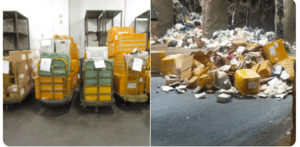Keeping The Drug Supply Chain Safe Keeps Patients Safe

Packages seized at an IMF in January 2019 Source: FDA Commissioner Scott Gottlieb’s Twitter account
U.S. Food and Drug Administration (FDA) Commissioner Scott Gottlieb, M.D., issued a statement about the agency’s continuing efforts to combat the spread of illicit opioids and to ensure the security of America’s drug supply chain. The FDA stepped up its enforcement and interdiction work targeting illegal, unapproved, counterfeit, and potentially dangerous medicine that enters our country through International Mail Facilities (IMFs), finding nearly 86 percent of packages pulled for additional inspection in recent years contained those items.
In 2017, the U.S. Postal Service (USPS) processed nearly 500 million international parcels. In an audit report released in September 2018, the USPS Office of Inspector General noted that 80 percent of online sellers of illicit drugs indicated that USPS was their preferred shipper. Special FDA agents assigned to IMFs work closely with U.S. Customs and Border Protection and FDA regulatory staff to identify suspect packages. Once the special agents identify those packages, the U.S. Department of Justice charges and prosecutes the offenders.
According to Commissioner Gottlieb’s statement, these port of entry investigations have been one of the most effective and successful ways to hold criminals accountable for disrupting the U.S. drug supply chain and patient safety culminating in hundreds of arrests, prosecutions, guilty pleas, and convictions. Additionally, the FDA works with other federal agencies to target international criminal groups that sell illegal, unapproved, and counterfeit medicines both directly to the public and via the Internet.
In August 2018, the FDA issued warning letters to four online networks operating a total of 21 websites that illegally sold potentially dangerous, unapproved, and misbranded versions of opioid medications. Commissioner Gottlieb warned that increasing numbers of patients who bought illegal opioids online have found that they either did not receive what they ordered or they were victims of a scam and received nothing at all.
The legitimate closed medicine supply chain allows the FDA to ensure the security of US patient treatments, and provide oversight and restriction to companies that violate safety standards. The FDA announced its first warning letter issued under the Drug Supply Chain Security Act (DSCSA) to McKesson Corp. Commissioner Gottlieb said, “The warning letter to McKesson outlines violations observed during inspections that took place this past summer, including failing to: sufficiently respond to notifications that there was illegitimate product in their supply chain; quarantine and investigate suspect products; and maintain records of investigations of suspect product and disposition of illegitimate product as the law requires.”
Gottlieb’s statement summarizes the importance of the U.S. closed medicine supply system and the risks to patients when shortcuts are taken:
“Just as critical are the FDA’s efforts to protect patients from exposure to drugs that get into the legitimate U.S. supply chain that may be counterfeit, stolen, contaminated or otherwise harmful, as well as making sure these same drugs aren’t being diverted for illegal sale. Entities within the supply chain must also comply with the law and do their part to respond quickly and thoroughly when notified of potential counterfeit, stolen or diverted products entering the supply chain. While the U.S. drug supply chain is among the safest in the world, complacency isn’t an option. Every link in the supply chain must be secure to ensure patient access to safe and effective medicines.”
Commissioner Gottlieb stated that the FDA will continue to work with manufacturers, repackagers, wholesale distributors, and other parties responsible for ensuring the supply chain take the necessary steps under the law to track and trace medications and respond to counterfeit medicine incidents when they happen to protect public health. He said, “With a tighter, closed system, we’ll be able to better detect and prevent the introduction of illegitimate products and enable stakeholders and the FDA to respond rapidly when such products are found.”